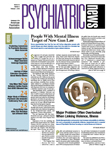Caring for a family member with serious mental illness can be a daunting experience to someone who lacks knowledge and resources. However, a study of an eight-week, mental illness course shows it successfully equips some caregivers with new information to help them do a better job.
Compared with a control group, the Journey of Hope course group showed significantly higher gains in its knowledge of mental illness and a decreased need for additional information on coping strategies and community resources, according to data in the January Psychiatric Services.
“The course empowered families with the knowledge they needed to care for relatives more effectively,” principal investigator Susan Pickett-Schenk, Ph.D., told Psychiatric News. And taking the course also helped the students feel less alone in their caretaking struggles, she said.
Pickett-Schenk, an associate professor of psychology in the Department of Psychiatry at the University of Illinois at Chicago, noted that it is not unusual for family members of individuals with serious mental illness to be left uninformed and in the dark when it comes to their relatives' needs.
When someone fractures a bone, she said, family members will often receive instructions from medical providers about what to expect in terms of healing, when the next appointment will be, and what types of medications the patient may take to relieve pain.
“When a family member is discharged from a psychiatric hospital,” Pickett-Schenk noted, “sometimes caregivers may not be aware of when the next appointment is, what medications should be taken by the family member, or what to expect in terms of the patient's symptoms” or recovery. Family-directed courses on mental illness, such as Journey of Hope, aim to address those knowledge gaps.
In the course, two trained volunteer instructors, who are family members of adults with serious mental illness, provide peers with the education, skills training, and emotional support they require as primary caregivers of adults with serious mental illness.
Covered in the course is information relating to schizophrenia, schizoaffective disorder, bipolar disorder, major depressive disorder, and obsessive-compulsive disorder.
During the course, which at the time of the study was being offered at three study sites in Louisiana, participants learned about biological causes, signs and symptoms, treatment relevant to these disorders, and emotional reactions and stages of coping that family members experience when caring for a seriously ill relative.
The course also covered community resources for people with serious mental illness and maintained a focus on recovery, according to Pickett-Schenk.
To determine the extent that Journey of Hope helped family members gain knowledge of mental illness, Pickett-Schenk investigated knowledge levels and information needs of 462 family members of adults with serious mental illness from December 2000 to June 2004 at three different time points.
Families were recruited to participate through newspaper articles and advertisements, televised public-service announcements, and flyers featuring information about the study.
Once recruited, half of the sample was randomly assigned to participate in the Journey of Hope course and half was placed on a waiting list to receive the course.
Pickett-Schenk evaluated family members using the 40-question Family Knowledge Scale, which included questions about the various topics covered in the course, and the Family Information Needs Scale, which asks participants to rate their interest in learning about 45 topics ranging from medications to coping strategies.
She evaluated all participants at baseline and then at three and six months later and found that compared with those in the control group, respondents who participated in the course had significantly increased their knowledge and decreased their need for more information (p<.001).
Though Pickett-Schenk could not say for sure if the benefits achieved by participants in the intervention group were not due to learning experienced outside the Journey of Hope curriculum, she acknowledged that the course and others like it, such as the National Alliance on Mental Illness's 12-week, Family-to-Family Education program, are comprehensive and of great help to primary caregivers of adults with serious mental illness.
She also shared a personal perspective. “As a family member, I've experienced the fear and frustration of seeing someone I love suffer the debilitating symptoms of mental illness and refuse treatment. I believe that my personal experiences help me understand the complex issues families face and the need to advocate for services that both help us as caregivers and help our ill loved ones,” she noted.
The course had not yet been offered to the public at press time.
